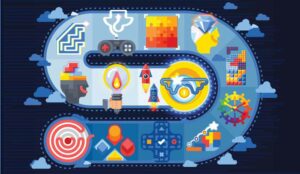A proper onboarding process for new employees means effective training. Discover how gamification can improve your corporate training in our comprehensive guide.
Just mention corporate training, and you’ll likely elicit an involuntary yawn. Immediately, people imagine lectures, long training sessions, and thick piles of paper.
However, this isn’t always the case thanks to recent developments in the field of gamification for corporate training.
With the right knowledge and tools, your corporate training can be turbocharged to be fun, engaging, and powerful, setting up your team members for success.
Read on to discover innovative ways to use gamification for corporate training, including best practices, tips, real-world examples, and more.
What Is Gamification?
Gamification is the integration of game-like elements into non-game environments. Think leaderboards, new levels, collecting coins, earning badges, and similar elements you may recognize from games on consoles, PCs, or mobile phones.
In the context of gamification for corporate training, these gaming elements are used to make training more motivating, engaging, and effective.
Why Use Gamification in Corporate Training?
Gamification in corporate training makes learning enjoyable and competitive, encouraging deeper interaction with the material, enabling better knowledge retention, and providing instant feedback.
It promotes teamwork and caters to different learning styles, enhancing retention and workplace culture. By making training interactive and adaptive, gamification increases job satisfaction and aligns with organizational goals, benefiting employees, customers, and the company.
This method’s effectiveness is proven by science: for example, gamification can improve the speed at which the brain processes and maintains information.
Best Practices for Gamification in Corporate Training
When implementing gamification for corporate training, there are some key best practices that should be taken into consideration.
For one, aligning the game elements with the educational goals is crucial. Start by identifying clear learning objectives and then design gamification strategies that directly support these aims.
For example, if the goal is to enhance problem-solving skills, incorporating scenarios that require critical thinking and decision-making can be effective.
It’s also important to ensure that the gamification mechanics are simple and intuitive, so they enhance learning without becoming a distraction.
You can also try a mix of reward types to cater to different motivational needs. Some employees might be motivated by public recognition, while others prefer tangible rewards or by simply beating their personal best.
Regular feedback is essential, as it helps learners see their progress and understand areas needing improvement. Additionally, consider your team’s competitive nature; while leaderboards can motivate, they should not discourage less competitive employees.
Balancing competition with collaborative tasks and the right elements (such as segmented leaderboards) can help maintain a healthy, productive learning environment for all participants.
10 Innovative Ways to Gamify Your Corporate Training
What follows are 10 innovative ways to add gamification for corporate training that can take your training programs to the next level:
1. Leverage Microlearning
Microlearning delivers bite-sized learning modules, making learning manageable, enjoyable, effective, and engaging. Ideally, it can be accessed from anywhere, including employees’ mobile devices.
2. Focus on Personalization
Leading gamification platforms offer personalized learning at scale, including coaching and performance management. Why be “one size fits all” when you can be laser-targeted at your audience?
3. Interactive Quizzes
Use quizzes throughout training sessions to keep the material engaging and to provide immediate feedback. Everyone loves a quiz, and this format remains a powerful learning tool.
4. Milestone Rewards
Introduce a system of rewards for completing certain sections of the training, such as digital badges or certificates. On a neuroscientific level, achievement can trigger dopamine – often called the “reward” hormone – as well as serotonin, the “happy hormone.”
5. Leaderboards
Create leaderboards to encourage a sense of fun competition among employees by displaying their scores or progress publicly.
6. Story-Driven Learning
Develop a storyline where employees progress through different levels or chapters of training as they achieve learning milestones. Examples could be exciting game narratives like a race or adventure.
7. Team Challenges
Learning doesn’t have to be individual – gamification can include team challenges, which increase engagement and drive collaboration and teamwork.
8. Point Systems
Implement a points system where employees earn points for completing training tasks, which can be exchanged for real-world rewards like extra vacation time, company swag, or gift cards.
9. Provide Feedback
People want to know how they’re doing. By providing personalized feedback, you’re answering this deep need while also driving improvements and increasing employee engagement.
10. Social Knowledge Sharing
Employees can earn additional points for sharing tips, tricks, or even reaching out for advice. Teammates can upvote contributions and contribute answers.
Use Cases for Gamification in Corporate Training
We’ve seen how gamification in corporate training can transform traditional learning methods and engage employees in diverse and practical ways.
Here are some of the use cases where gamification for corporate training can be implemented by your organization today:
- Onboarding new employees: Gamification can make the onboarding process more interactive and engaging
- Sales training: Simulations and competitive games can be used to teach effective sales strategies and techniques, with rewards for top performers
- Compliance training: Often dry, compliance training can be livened up with quizzes and point systems to encourage understanding and compliance with company policies
- Skill development: Simulations and microlearning tasks help employees practice real-world scenarios, improving skills such as negotiation, leadership, and problem-solving
Using these methods, gamification breaks the monotony of traditional training while offering a dynamic and memorable learning experience.
As companies look for innovative ways to develop talent and build skills, gamification serves as a powerful tool to motivate employees.
Real-World Examples of Successful Uses of Gamification in Corporate Training
MSX International, a company with a presence in 80 countries and a workforce of 6,000, is revolutionizing training in the automotive industry.
They collaborated with Centrical regarding gamification for corporate training rather than developing their own platform to enhance their training programs’ technological and engagement aspects.
Our platform provides MSX with a gamified, reward-based learning environment that is closely tied to performance metrics, making training delivery more effective and engaging.
The partnership has been particularly effective in tailoring learning experiences to diverse employee demographics.
Our adaptable platform offers personalized microlearning modules, peer-contributed tips, and real-time performance tracking, allowing for a highly customized training approach.
This strategy not only boosts employee engagement and learning outcomes but also leads to greater trust from MSX’s clients.
The success of this approach is evident in the improved business decisions and client satisfaction that MSX has achieved through more engaged and well-trained employees.
A Gamification-Based Performance Experience Platform
A platform leverages advanced gamification solutions to provide a corporate training experience that is powerful and engaging.
It uses a combination of solutions to deliver unparalleled outcome. These include:
Personalized Learning Journeys
Learning paths are constructed with integrated missions, guiding learners through a sequenced training regimen. Progression through the curriculum generates points and achievements, boosting motivation and engagement.
Interactive Learning Experiences
Training becomes entertaining with dynamic learning missions and tailored role-playing activities. Artificial intelligence supports knowledge retention through targeted quizzes, while GenI can be used to create educational material.
Monitoring Learning Milestones
Learners have the ability to track their achievements and gauge their proficiency through key performance indicators. Engagement in learning tasks enhances their rank, while solo and team challenges ensure a concentrated effort to achieve their goals.
Incentives for Achievement
Right from the outset, learners are engaged to complete tasks, level up, gain acknowledgment from peers and managers, and unlock new learning modules and recognition.
Upon completion, they can exchange accumulated points in the virtual marketplace for rewards such as gift cards, branded merchandise, and non-monetary incentives like additional personal time off.
Conclusion and Learnings
Gamification can be used to completely overhaul outdated corporate training initiatives, ensuring that employees have the skills and motivation to succeed right from the outset. Some key takeaways include:
Align gamification elements with educational goals: not all elements are relevant all of the time; choose carefully to ensure a powerful, valuable outcome
Choose a mix of game types: this is the best way to appeal to the different types of people who will be going through the training
Embrace the best of gamification: from time-bound quests to microlearning, ensure you’re aware of the options available so that you can choose the right elements for your needs
A platform offers the entire end-to-end solution when it comes to gamification for corporate training, giving you instant access to best practices and all gamification options
Author: Guest Author
Published On: 20th May 2024 - Last modified: 23rd Oct 2024
Read more about - Guest Blogs, Centrical















